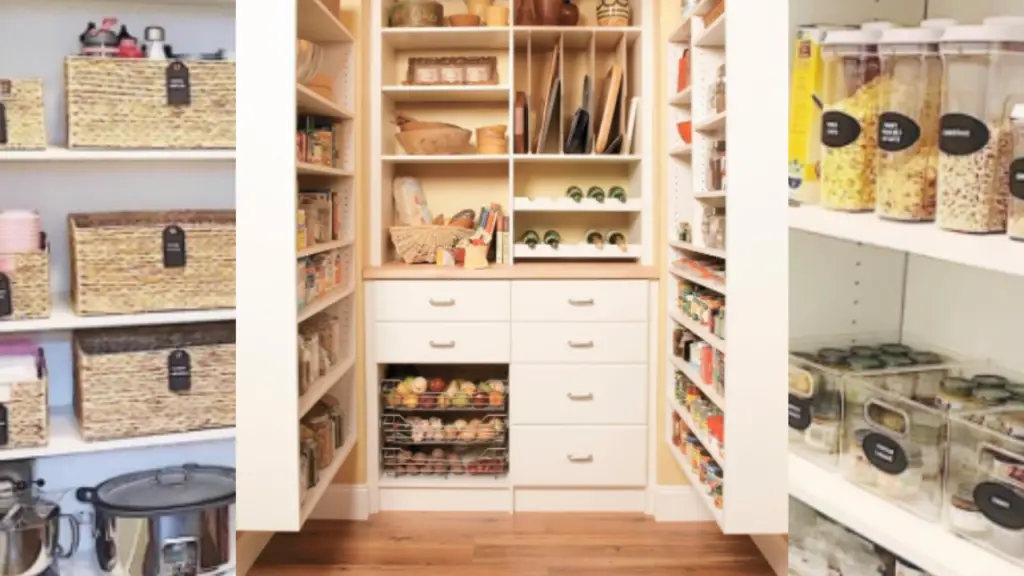
When building a new house or remodeling an existing kitchen, it’s normal to argue whether to go with a walk-in or cabinet pantry. Some homeowners like a large nook with floor-to-ceiling shelves and custom inserts, while others are content with a few shelves and pullouts tucked inside a kitchen cabinet.
Table of Content
The Advantages and Disadvantages of Walk-In vs. Cabinet Pantries are below.
Walk-in pantry advantages
They have a larger storage capacity.
- A home chef’s best buddy is a walk-in pantry.
- When it comes to sheer storage capacity, they are unrivaled.
- They are spacious enough to hold dozens of ingredients, cookbooks, snacks, pots, pans, medium to large kitchen gadgets, and more, thanks to multiple walls of floor-to-ceiling shelves.
They have the potential to be more organized.
- Cabinet pantries are not inefficient by any means, but walk-in pantries allow you to be more inventive with your storage solutions.
- Your goods can be sorted by row or column, food group, and so forth.
- Consider designating a column of shelves for non-refrigerated fruits and vegetables, as well as your most often used oils and spices.
- With built-in tray separators, you might even be able to store your baking sheets.
They can easily store larger appliances.
- Toasters, mixers, and coffee makers, can also be stored in cabinet pantries, although this usually comes at sacrificing important storage space.
- Larger equipment like microwaves, slow cookers, juicers, and deep fryers can fit comfortably in walk-in pantries, freeing up space and ensuring they’re ready to use when you need them.
- Some pantry spaces may be large enough to accommodate a second refrigerator.
Walk-in pantry disadvantages
Storage is more dispersed.
- Bigger is not always better, especially when you’re in a hurry to get dinner on the table.
- In a huge walk-in pantry, gathering your supplies may take a few extra minutes.
- You can easily forget where you kept specific irems.
- Walk-in pantries are also a little further away from appliances and prep areas, limiting cooking efficiency.
- Some homeowners enjoy having items on hand in their kitchen since it is more convenient.
They may necessitate additional maintenance.
- Unfortunately, having a well-organized pantry has a cost.
- More space + more shelves mean more to clean and organize.
- Cleaning dirty surfaces and decluttering shelves requires time and effort.
- If you want to cut down on your weekly to-do list, a cabinet pantry with less storage and care might be the way to go.
They take up a lot of space.
- Walk-in pantries have the disadvantage of requiring a lot of space to be effective and efficient.
- When planning a new kitchen or remodeling an existing one, you’ll need to reduce the footprint of your kitchen to make room for a walk-in pantry.
- This can be a problem for homeowners who are already short on space and wish to maximize their kitchen size.
Cabinets Pantry advantages
There is more tight storage space.
- Unlike walk-in pantries, which have many walls of shelves, cabinet pantries have just one shelf for all of your snacks, ingredients, and small appliances.
- No need to go through many walls or shelves to find what you’re looking for.
- When you spend less time looking, you have more time to cook.
Storage is easier to reach.
- Time spent walking to and from your pantry will reduce if it is located in the center of your kitchen.
- It will generate hyper-efficient workstations if you place them next to your refrigerator and across from your range.
- Inside features can also improve the accessibility of your cabinet pantry.
- For example, pullout drawers allow you to see every snack and ingredient at once, reducing the amount of time you spend rummaging.
They don’t take up a lot of room, which is a plus.
- As opposed to walk-in pantries, which require a large footprint, cabinet pantries are smaller.
- The majority of them are 24 to 36 inches wide.
- As a result, they’re a practical storage solution for small or medium-sized kitchens, allowing you a little more shelf and drawer space without sacrificing too much.
Cabinets Pantry disadvantages
They have a small amount of storage capacity.
- For some homeowners, especially ardent cooks, a single pantry cabinet will be insufficient.
- Larger appliances can fit inside a cabinet pantry, but they take up a lot of the available space.
- Installing multiple cabinet pantries in your kitchen is one option to increase storage capacity, but this will take up more counter space.
They add to the cost of the cabinet.
- If you’ve ever done a complete kitchen remodel, you know that cabinets aren’t inexpensive.
- Because of their height and any special features they may incorporate, cabinet pantries are substantially more expensive than the regular base or wall cabinets (such as pullout drawers and spice racks).
They take up counter space.
- No matter how small your cabinet pantry is, you’ll undoubtedly sacrifice some counter space.
- Prepare to give up a large amount of prep space if you designate numerous cabinets as pantry storage.
- In either case, it’s critical to strike a careful balance between storage and counter space.
- This loss is less noticeable in bigger kitchens, but it can impact how a smaller kitchen operates.
- When making a decision, think about the size of your kitchen and how you cook.
